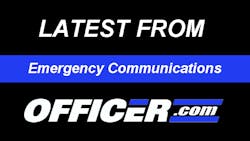On a panel about technology versus the human aspect of policing, former Society of Police Futurists International (PFI) President Joseph Schafer, Ph.D. stated, “Policing is still the most effective when it is done with people not to people.” The panelists described how many of the recent major conflicts, such as Ferguson had roots in the move away from true community policing. Yes, there are a number of elements on both sides that created the mess but the lack of cohesion between the protected and the protectors was a major factor in the dissonance that occurred. Each element of public safety can look to the statement of with versus to to determine the best way to not only connect with the community they serve, but also to do their job efficiently and safely. This includes the first first-responders - 911 Dispatchers.
Not Personal
As a 911 Dispatcher, it can be easy to start feeling separated from our callers. Some days it feels like everyone who calls 911 or the non-emergency police line is demanding and rude. We already work in a part of public safety that feels dismissed or ignored and it is easy to let this get to us when we’re working with the community. It seems like just one more person who is discounting our important role in the process of emergency services. We’re just some voice on the other end of the line without feelings. “Listen, Lady. Just get me a cop. Got it?” It’s been over a decade since I last heard those words and the memory still makes my blood boil. It makes me want to hurt someone. This makes it even more important to remember that the person on the other end of the line doesn’t know you and they do need you to help them. They just don’t know how to ask in a way that is appropriate. It’s not personal. They would do the same thing to anyone who answered their plea for help. Remembering that we signed up to serve and not just serve the nice, socially appropriate callers but everyone who needs us. If we can let the rudeness slide off our backs, we can work with people and not feel like doing awful things to people.
Patience
Not taking things personally co-occurs with the element of patience. It’s easy to wonder about the IQ of some of our callers, especially those who act as if they stand two steps above us. They don’t have a clue about how our job or policing works but they are super willing to tell us how things ought to be. The media is definitely not our friend in this regard as a number of shows, movies and YouTube videos exist to give every citizen a crash course on how to do public safety’s job, especially ours. Acting with patience requires us to acknowledge just that. Citizens have NO idea how to do our jobs. They don’t know how to do an officer’s job, a fire fighter’s job or a medic’s job. Of course they don’t. So steaming about how they should be able to assist us by knowing just basic information, like their location isn’t helpful to us because they aren’t required to know. If callers knew how to do our jobs there wouldn’t be a dispatcher shortage throughout the country and we could finally have a day off. Or at least not have to work mandatory overtime one of our two scheduled days off. Remembering that people don’t know what’s going on even though they think they do is a good start to the patience we need to work with them. Note: this does not mean explaining to them how ignorant they actually are no matter how tempting.
Protection
Although the third element, protection affects citizens, it turns the with people back to our colleagues. Like with callers it can get frustrating to work with the wide variety of field responders we deal with on a daily basis. Some respect and honor what we do and some treat us like second class citizens. Regardless, it is a large part of our job to do our job well and not add to any reason that might keep them from going home at the end of the shift. I’ll take this time to remind each and every 911 Dispatcher what a sergeant at the West Coast Post-trauma Retreat (WCPR) expressed which is that it is not our job to make sure they go home. We don’t have that kind of power any more than other officers do. We can do our jobs exceptionally well and tragedy still happens. But when we work with field responders and not let ego get in the way, we can offer them all the protection we humanly can.
It’s so easy to feel like those of us in public safety are living in a whole different world from the people we serve especially in today’s atmosphere of hate and fear. Returning to Schafer and the panel of experts, they stated we were at the peak of a 50 year cycle and if history rings true things are going to start improving again. Communities and firs t responders will start to have common goals and build partnerships that allow everyone to accomplish their given tasks. If, as 911 Dispatchers we remember to work with the community rather than do things to the community we can bring about these positive changes even sooner. That will not only make our jobs easier and more pleasant, but keep our field responders safer which is usually our main personal goal.
About the Author
Michelle Perin
Michelle Perin has been a freelance writer since 2000. In December 2010, she earned her Master’s degree in Criminology and Criminal Justice from Indiana State University.

